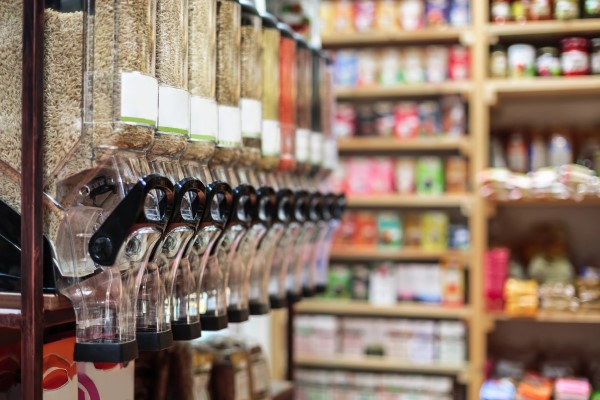Just because something’s sold in a health food store doesn’t mean it’s good for YOU!
This is a shout out to all the people who want to do good things for themselves, but feel confused. I get it. I’ve been there. None of us are immune to the elaborate marketing campaigns strategically designed to influence our choices.
That’s why I never stop studying and why I’m so compelled to share what I learn with you. Part of the healing process involves shopping at health food stores, but let me tell you – buyer beware!
Let’s take a close look at 6 things you need be aware of when you walk through the door of a health food store:
Gluten-Free Foods
Good lord. This section of the store hurts my soul. While I am grateful for the rising awareness that food contributes to chronic inflammation, these are not value-added. Read the ingredients. What you normally see is a long list of gluten-free refined flours that are not really going to do your body any favors. They are often nutritionally void and contain a ton of sugar.
What you need to look for:
When you read the label, you need to see real food, and you may need to start baking at home. Click here to receive a free e-book of recipes titled Sweets in Peace. It can help.
Other than that, macaroons can often be a good choice (just watch the sugar content) and so is a company called Cappello’s.
Protein Powders
At best, these are a crutch. Our ancestors didn’t have access to protein powders and they didn’t drink smoothies. Protein powders are a processed health food, and they lack an essential macronutrient: FAT.
That’s right. Mother Nature packages protein with fat. The yolk of an egg. The skin on a chicken or turkey. The oil in a nut. Protein is an important building block, but fat is your body’s preferred fuel.
You’d be better off eating a steak.
What you need to look for:
If you really want to supplement with a protein powder, animal is always best. That way you get the full profile of amino acids. Collagen, gelatin, and whey (if not sensitive to dairy) can all be helpful short-term. Great Lakes and Vital Proteins are both good brands to consider.
If plant-based is the thing for you, I like Innate made with pea protein.
And like I said, add the fat back. Put an avocado, coconut oil, or scoop of nut butter in your protein smoothie.
Energy Drinks
Yes, these are still sold in health food stores. Do NOT under any circumstances consume caffeine outside of what nature intended. It is a synthetic manmade chemical that comes from China.
Did you know that synthetic caffeine at a high enough dose is a lethal powder? Yet, no one dies from coffee or tea consumption. It’s thought that nature packages the caffeine with protective phytochemicals. In addition, there’s only so much coffee or tea one can drink before you start to feel off or have digestive upset so that is protective as well.
And all of these great energy drinks with added herbs. Please. Oh please. There isn’t enough plant materials in these to do a damn thing. Enjoy your homeopathic dose of herbs, because that’s all you’re getting.
What you need to look for:
Unsweetened or naturally sweetened green teas are good. I’ve always enjoyed Honest Tea’s Moroccan Mint flavored with honey. You can also purchase Reishi Roast online from Farmacopia. There is enough herbal material in this beverage to have an effect. Reishi helps your body adapt to stress and gently calms the nervous system.
Check out a book called Caffeinated by Murray Carpenter to learn more about this drug in our food supply.
Salad dressings and refined vegetable oils.
Canola, corn and soy bean oil are everywhere, particularly in health food stores because everyone is still stuck in an industry-driven paradigm: animal fats cause disease, while fats from plants support our health.
We are here today as human beings because our ancestors prized animal fats. The very thing that we have demonized gave us life and intelligence.
Canola, corn and soybean oil are processed, industrialized foods that are very new to our bodies. Is there anything oily about corn or a soybean? NO! Machines extract the oil and severely damage it in the process.
Here’s a rule of thumb: if you can’t theoretically make the oil yourself, don’t consume it. For example, I could have a cow, milk it and make butter. I could also take olives and press the oil out by hand with the right equipment.
Not so with canola, corn and soy bean oil. Here’s another way to think of it: if you were to step on the food that the oil is coming from, it should leave an oily stain on the floor. If not, think twice.
By the way, canola oil comes from the rape seed. Seriously, the rape seed. Does that sound like something that will promote your health and well being?
The key thing you need to understand is that inflammation underlies every single chronic disease in our modern world. The reason for that is that your cell walls are made of fat, and if you eat poor quality fat, then your cells will not communicate very well and are primed for inflammation.
What you need to look for:
Butter, ghee, coconut oil, lard, and olive oil.
Primal Kitchen is a good, tasty brand of salad dressing that uses avocado oil, but nothing is better than what you can easily make in your own kitchen.
Fatworks is my favorite brand of lard and if you want to read a good book, check out Primal Fat Burner from Nora Gedgaudas.
Sugar.
God, why do I even have to write this? It’s so annoying. But I feel compelled to write this because the truth is that high fructose corn syrup and artificial sweeteners make sugar look like a health food.
We see it all the time on health food labels, “Made with REAL sugar,” as if that’s a good thing.
The truth is that sugar is a drug that causes disease over a long period of time. I’m not going to elaborate on this point. The less you consume, the better off you will be.
What you need to look for:
Read labels to avoid sugar, high fructose corn syrup and artificial sweeteners. Also, be sure to limit natural sweeteners, like honey and maple syrup.
Check out Gary Taubes new book The Case Against Sugar.
I hope that this is a helpful conversation as we navigate this confusing world of health and wellness together.
#6 on my list is one that you truly don’t want to miss and warrants it’s own conversation, so I’ve decided to include it in my weekly newsletter (it comes out every Wednesday). When you sign up you’ll also get a copy of my super juicy booklet of all-time favorite resources. Don’t worry – it’s sugar free and contains no artificial ingredients.
Visit your health food stores in peace!
Love,
Charlotte

